|
FAQs About Turtle Identification 3
Related Articles: Turtles, Shell
Rot in Turtles, Amphibians,
Red Eared Slider Care,
FAQs on: Turtle Identification 1, Turtle ID 2, Turtle ID
4,
Related FAQs: Turtles 1, Turtles 2, Red Ear
Sliders, Turtle Behavior,
Turtle Compatibility, Turtle Selection, Turtle Systems, Turtle Feeding, Turtle Disease, Shell Rot, Turtle Reproduction, & by Species:
Musk/Mud Turtles, Softshells, Snapping Turtles, Mata Matas, Tortoises, & Amphibians, Other
Reptiles,
|
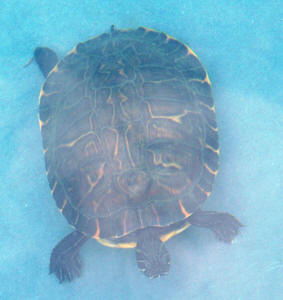
|
|
identify turtle 5/9/11
Dear Crew,
<Hiya Ladean, Darrel here>
This turtle belongs to my pastor.
<Sure '¦ if we had a dime for every time we heard
THAT story '¦.>
We are trying to identify what kind of turtle it is.
He says it does not have red on his face. I thought it was a
slider.
<It could be a slider>
However, he has had a person knowledgeable of sliders and that
person says it is not a slider.
<Hmmm>
We live in the Houston Texas area.
<I live in the Los Angeles area. Howdy neighbor!>
Can you assist in identifying this reptile friend?
<I'd like to see a picture of his face, from the side, not
retracted. Does it have ANY kind of circle where the
"red" would be? The reason I'm asking is that ONLY
the Pseudemys scripta ELEGANS has the "red" ear. That
mark can be yellow, green and even orange in other forms of
sliders.>
<On the other hand '¦ if his skin is yellow and
BLACK rather than yellow and GREEN '¦ she's likely
a Pseudemys concinna (Cooter)>
<What it's NOT '¦>
<It's not a snapping turtle, softshell turtle, Galapagos
tortoise or a toaster oven>
<Whatever it is '¦ it's big, it looks healthy
and it's fun to have as a pet>
Ladean
|
|
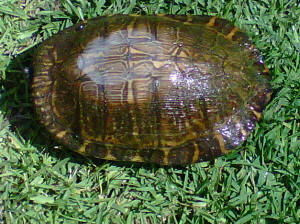
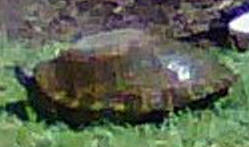
|
|
Re: identify turtle 5/11/11
Here is the only other view I have so far. I think it might be a
peninsula Cooter after what you said below. Or a toaster
oven.....
<Green & Yellow stripes = sliders. Black & Yellow
stripes = cooters>
<The good news is that the CARE is identical in every way.
Diet, health issues, even breeding -if she finds herself a fella-
are all interchangeable>
To me those shells are the same.
<Ya seen one shell, ya seen 'em all>
Ladean
|
|
Turtle ID 4/30/11
Can you identify this turtle?
<Sure>
<His name is Jeff.>
Rich
|
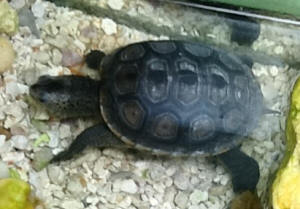  |
Re: Turtle ID 4/30/11
Thanks, but I was hoping for something more specific.
<Uh '¦ OK>
<Rich - what you have there is a Diamondback
Terrapin. They're a great turtle to have as a pet,
they're smart, engaging, curious and personable. They're
one of the more aquatic species - meaning they like lots of water
to swim, play, explore (or do whatever turtles do) and since they
are a brackish water species (meaning a mixture of salt water and
fresh water), it takes a tiny bit (and I do mean just a tiny bit)
more effort to keep them as a long term captive. In my opinion
(also known as the "right" or "correct"
opinion) it' worth the effort.>
Re: Turtle ID 5/1/11
Thank you for the info.
<Yer welcome>
We have had him for about two weeks now. He seems to be doing
well. We currently have him in fresh water with and area for him
to get out of the water if he wants. Also got a UV light lamp as
we were told it is good for his shell. Should we look into a salt
additive for the water? We are feeding him ReptoMin plus turtle
food. He seems to like it especially the shrimp pieces. Are there
any other tips you can pass along regarding taking care of our
diamondback terrapin?
<You're starting out well. Below is a link that covers the
basic care for Red Eared Sliders - and it turns out it's the
basic care for all water turtles, with a few variations for each
type.>
<In Jeff's case, the standard care is also good for him
with the addition of some salt water to his fresh water. HOW MUCH
is a matter of discussion among experts, but the good news is
that there really isn't a wrong answer. Ideally we make
brackish water by taking 1 part fresh water and one part salt
water from our local fish store. People who live near the ocean
and have access to actual ocean water that isn't contaminated
with oils, chemicals or other waste can use that. So Ideally,
each time to change water, you'd make this half & half
mix and then when you're just ADDING water - you add only
fresh water, since the salt stays in the tank when the fresh
water evaporates.>
<BUT - this is the deciding factor for you: It's not
critical that it be a 50-50 mix. Most everyone agrees that at a
1:2 ratio Jeff will get the benefits of the brackishness. What we
don't want is to make keeping Jeff such a pain for you that
decide to give him up. If obtaining that much marine water on a
regular basis is a problem for you, then keep Jeff in the current
fresh water setup (change the water every week) and prepare a
50-50 mix once a month - say 3 inches in a small plastic tub -
and give him a bath for a few hours. At that rate, 5 gallons of
marine water would last you 5 months or so and he'd get the
benefit of the salt water on his skin & shell>
Thanks again for the info.
|
Sick turtle needs ID -- 07/17/10
Hello,
<Hiya - Darrel here>
I have a very sick turtle.
<Sorry to hear it>
We bought 'her' from a chain pet store in 2001, she was labeled
as a Suriname Wood Turtle, which doesn't seem to be totally
truthful.
<You're not saying that the turtle is untruthful, are you? Most
turtles are honest and trustworthy. In my experience the only thing to
be aware of is that Sliders and Cooters are very bad with money and
should never ever be allowed access to your ATM card or check
book>
She's been healthy until recently, and has a feeding tube now that
will hopefully save her as she has stopped eating. Even our vet, who is
very qualified with exotics, can't quiet place her. The closest
I've ever come to seeing any turtles that look like her is under
your pictures in the 'FAQs About Turtle Identification' on the
entry dated 4/11/2006 with the name of Brandon C. Heuyard.
<You're saying I identified that turtle as Brandon C Heuyard?
Usually I don't give turtles last names OR middle initials. I
wonder what I was thinking? Or Drinking?>
In that entry, I don't see where the turtle was positively
identified. I looked up the suggestion made that it is a 'Clemmys
muhlenberg' and found that the eyes are far to dissimilar. Do you
know if that turtle was identified? It may help me to provide a better
palatable diet and habitat for my sick little friend.
<OK, Laura -- now lets see if I can be serious and helpful at the
same time.>
<The information from the chain store may be more accurate than you
think.
The genus of the turtle in that picture is Rhinoclemys, of which the
Suriname Wood Turtle is a member (R. Punctularia). Take a careful look
at the octagonal pattern of the scutes on the shell. Note that the ones
in the center are roughly octagonal, but not symmetrical. Now look at
the two lines that join to point forward and the two lines that join to
point rearward. In a Clemmys, the two short lines are on the front end
while in a Rhinoclemys the two short sides are toward the rear.>
<That sounds like of nebulous -- like it may be in the eye of the
beholder -- and furthermore I can assure you that the more you stare at
it, the more often you'll change your mind as to what you see. My
first glance inspection of Brandon is that he's a
Rhinoclemys>
Thank you in advance,
Laura
|
Need help w/ turtle i.d.-what to do??
5/24/10
Hi - -
<Hello>
I'm hoping you can assist me. I had posted this on another
site but, alas, after 95 hits nobody left me any info. We just
want to do what's best for this little guy.
<Tis good>
About a week ago this turtle showed up in our backyard. Not sure
how he got there since we're all fenced in. He's a little
over a foot long. Last Sunday 'Tommy Turtle' found his
way into our pool. We've fished him out several times and
given him some other water options but he's determined to be
lounging in the pool.
We don't know of anyone in our neighborhood that had a pet
turtle but we do live near a big pond; could he of traveled from
there?
<Sure>
We would like to know what kind he is and if he should be taken
back to the pond.
<Mmm... maybe. There's a chance that this animal is a
"lost pet"... that wandered out of a yard, perhaps
while the owner was cleaning its system... or allowing it a bit
of UV/Sunlight for the day... I'd try posting some "Lost
Turtle" posters about the neighborhood, perhaps listing this
animal on Craig's List for your locality>
Of course, our daughters would love to keep him but with how big
he is I'm not sure if we could give him all that he needs or
even what that would entail.
<Easy enough to do... Read here:
http://wetwebmedia.com/FWSubWebIndex/RESCareBarton.htm
by Darrel... the care of this species is identical>
Any help would be appreciated. Thank you!
~Heather
<Oh, I believe this is a painted turtle... Maybe Chrysemys
picta. Bob Fenner>
|
  |
Re: Need help w/ turtle i.d.-what to
do?? 5/24/10
Bob - -
<Heather>
Thank you so much for the info. I did check out the link for the
care of an RES, however, is an indoor enclosure an option for
'Tommy'?
<Oh yes>
He seems A LOT bigger than the turtles in the pics. We will
definitely put some signs up near the bulk mailbox area to see if
anyone has lost their pet. If no one comes forward and we decide
that this is not something that we can do, should we take him back
to the pond area?
<I would not do this... there is too much chance of this animal
being a vector for disease to native wildlife... and being an
errant pet, unfamiliar w/ predators>
Is that painted turtle 'native' to Northern
California/Sacramento Area (where we live)?
<See the Net re...>
Also the whole pool thing, he just won't stay out. We do have a
kiddie pool that we pull out for our dog in the summer time; should
we put Tommy in that instead?
<... please read where you were referred... Turtles need
specialized care... this species, room to get out of the water,
provision of UV light wavelengths, heat... simple
foods/feeding...>
I really appreciate all your help. Thank you!
Heather
<Please help yourself. Read. BobF> |
|
Which kind of slider turtle? ID 5/23/10
I found your website while doing a search for slider turtles and
have a question. My husband brought home a turtle today for our
kids, he found this guy under his truck at the water treatment
plant where he works. Once home we had no idea what kind of
turtle it was so I'm hoping you can help.
I have narrowed it down to the slider, but its not colored like a
red-eared or yellow bellied slider. He's got all the same
traits other than that one. He's about 7" long (not
counting the tail) with the long front claws and webbed back
feet, he's green and yellow striped all over and after being
submerged in the bathtub he's happy as a clam. I was
wondering if there were varying degrees of "red" on the
red eared sliders. He's got the solid patch where the ears
are, but its more a muddy brown that blends with the rest of his
head.
<If it looks very similar to a Red-ear Slider, Trachemys
scripta elegans, but lacks the red ear patches, then it is most
likely one of the other Trachemys scripta subspecies, such as
Trachemys scripta troostii or Trachemys scripta scripta. But it
could be one of the related species of Trachemys
("sliders") or Pseudemys ("Cooters"). Without
a photo it's difficult to be sure.>
As we live in NC where there's mostly box turtle and snapping
turtles, we wanted to find out as much as we could about him.
After reading all the upkeep I think we'll probably free him,
but I wanted to educate my kids on
this cool turtle before we let him go. There is a nice pond near
our home where we would probably let him go, is this right for
this turtle??
<Very difficult to say. If he's an escapee, then release
into the wild would be risky. Without recognizing predators, or
the danger of things like automobiles, he'd not last long.
Plus, if he isn't native to your area, releasing him into the
wild is not only dangerous for the local environment, but likely
against the law, too. It is MUCH better you contact
your local Fish & Wildlife agency or an animal rescue
charity, and have them deal with the problem in a the most
humane, ecologically sound manner.>
Thanks for the help!
Lori
<Cheers, Neale.>
Re: Which kind of slider turtle? -
5/23/10
Thanks for the names Neale. I Googled both of the kinds you
listed and still can't decide. He's very similar to the
Cumberland slider with the exception of the spots on the bottom.
This one has the 2 centered spots on the belly as with the
Trachemys scripta scripta. I'll have to upload some pictures
from my camera and send them to you. I'll also contact the
local wildlife officer, as we have a park nearby with people to
talk to!!
<Very good. The ideal outcome.>
In the meantime, will he be okay in our bathtub for another day
or so?
<Yes.>
I've been keeping the water above room temp, changing it
every few hours so he doesn't get cold.
<In summer this shouldn't be an issue.>
But I have nothing to put in there for him to climb above water
level.
<For a day or two, not a problem.>
I'm not sure what to feed him as far as plants but I did read
that they can go up to a week without eating. I would rather not
starve him though!
<Curly lettuce, raw white fish, cooked prawns are all suitable
items.>
Thanks again
Lori
<Happy to help. Cheers, Neale.>
Re Slider turtle - 5/24/10
Neale,
<Ahh, he's "out" today, tomorrow>
this is the slider we have in our tub. This is the best shot I
can get of his head, he's really shy unless totally
submerged.
Please let me know what you think. I am going to go to the park
tomorrow and talk to the wildlife officer and see how best to
release him, they might want to keep him! At least I'm hoping
so!!!
Thanks again for all the info!
Lori Merritt
<Looks like a healthy, though wild specimen. Good luck, life.
Bob Fenner>
|
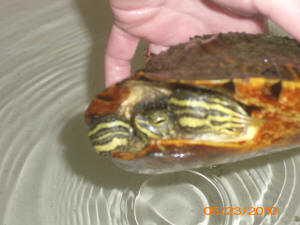  |
|
Turtle id 10/24/09
Can you please id this turtle shell. Thanks in advance!
<Hello Pat. While I'd hazard a guess this is some species
of Testudo, or perhaps Geochelone, beyond that I can't offer
any kind of helpful answer without extra data. It's certainly
what here in England we call a
"tortoise" -- that is, a terrestrial rather than
freshwater/brackish water "terrapin" or a marine
"sea turtle" (in British English, the three kinds of
chelonian are separated, rather than lumped under the single word
"turtle",
even though etymologically, "turtle" and
"tortoise" mean the same thing).
Identifying chelonians from their shells alone is a bit of a fine
art since there's much variation. We're primarily fish
people here, and while Darrel and I are probably familiar with
the more common freshwater
turtles/terrapins kept as pets, your chelonian shell isn't
one of those species. I'd suggest getting in touch with the
herpetological department of your nearest zoo or natural history
museum and finding out if they can
help. Cheers, Neale.>
|
 |
|
|

